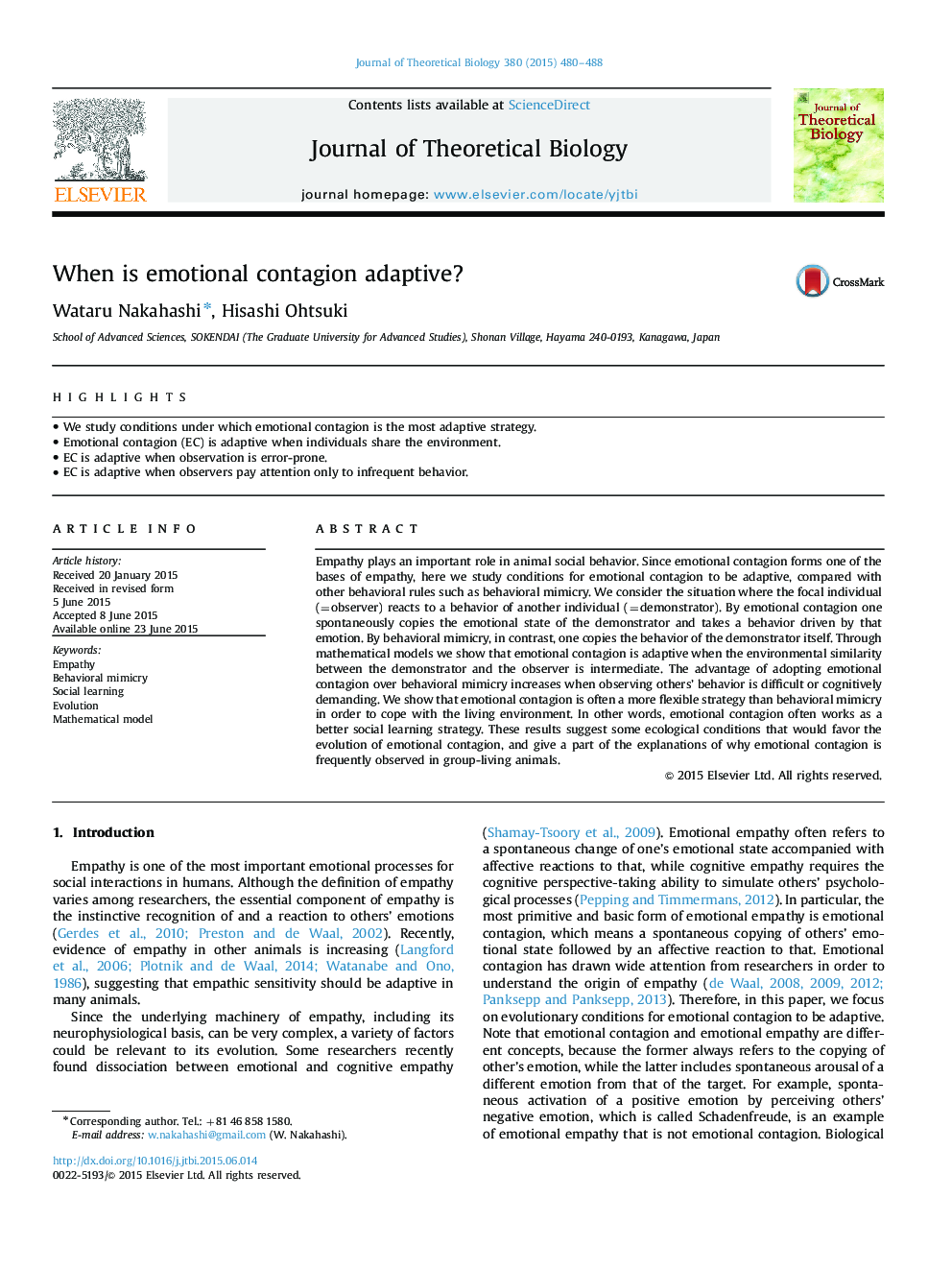| کد مقاله | کد نشریه | سال انتشار | مقاله انگلیسی | نسخه تمام متن |
|---|---|---|---|---|
| 6369683 | 1623830 | 2015 | 9 صفحه PDF | دانلود رایگان |
عنوان انگلیسی مقاله ISI
When is emotional contagion adaptive?
ترجمه فارسی عنوان
وقتی انعطاف پذیری عاطفی است؟
دانلود مقاله + سفارش ترجمه
دانلود مقاله ISI انگلیسی
رایگان برای ایرانیان
کلمات کلیدی
یکدلی، تقلید رفتاری، یادگیری اجتماعی، سیر تکاملی، مدل ریاضی،
ترجمه چکیده
همدلی نقش مهمی در رفتار اجتماعی اجتماعی دارد. از آنجاییکه انسداد عاطفی یکی از پایه های همدلی است، در اینجا شرایطی را برای انگیختگی عاطفی در مقایسه با سایر قوانین رفتاری مانند تقلید رفتاری مطالعه می کنیم. ما وضعیتی را که در آن فرد کانونی (= ناظر) به رفتار فرد دیگری (= تظاهر کننده) واکنش نشان می دهد، در نظر می گیریم. با عواقب هیجانی یک حالت خودآزاری حالت احساسی تظاهر کننده را کپی می کند و رفتار ناشی از آن احساسات را می گیرد. در مقابل، با تقلید رفتاری، یک رفتار تظاهرات کننده را به صورت یک نسخه تکرار می کند. از طریق مدل های ریاضی نشان می دهد که انحطاط عاطفی زمانی سازگار است که همبستگی محیطی بین تظاهر کننده و ناظر بینابینی باشد. مزیت اتخاذ شیوع عاطفی بر روی تقلید رفتاری افزایش می یابد زمانی که مشاهده رفتارهای دیگر دشوار یا شناخته شده است. ما نشان می دهیم که پرخاشگری عاطفی اغلب یک استراتژی انعطاف پذیر تر از تقلید رفتاری برای مقابله با محیط زندگی است. به عبارت دیگر، شیوع عاطفی اغلب به عنوان یک استراتژی یادگیری اجتماعی بهتر عمل می کند. این نتایج نشان می دهد که برخی از شرایط محیطی است که به تکامل مسمومیت های عاطفی لطمه می زند و بخشی از توضیحات مربوط به اینکه چرا در حیوانات زندگی گروهی دیده می شود، اغلب مشاهده می شود.
موضوعات مرتبط
علوم زیستی و بیوفناوری
علوم کشاورزی و بیولوژیک
علوم کشاورزی و بیولوژیک (عمومی)
چکیده انگلیسی
Empathy plays an important role in animal social behavior. Since emotional contagion forms one of the bases of empathy, here we study conditions for emotional contagion to be adaptive, compared with other behavioral rules such as behavioral mimicry. We consider the situation where the focal individual (=observer) reacts to a behavior of another individual (=demonstrator). By emotional contagion one spontaneously copies the emotional state of the demonstrator and takes a behavior driven by that emotion. By behavioral mimicry, in contrast, one copies the behavior of the demonstrator itself. Through mathematical models we show that emotional contagion is adaptive when the environmental similarity between the demonstrator and the observer is intermediate. The advantage of adopting emotional contagion over behavioral mimicry increases when observing others' behavior is difficult or cognitively demanding. We show that emotional contagion is often a more flexible strategy than behavioral mimicry in order to cope with the living environment. In other words, emotional contagion often works as a better social learning strategy. These results suggest some ecological conditions that would favor the evolution of emotional contagion, and give a part of the explanations of why emotional contagion is frequently observed in group-living animals.
ناشر
Database: Elsevier - ScienceDirect (ساینس دایرکت)
Journal: Journal of Theoretical Biology - Volume 380, 7 September 2015, Pages 480-488
Journal: Journal of Theoretical Biology - Volume 380, 7 September 2015, Pages 480-488
نویسندگان
Wataru Nakahashi, Hisashi Ohtsuki,
